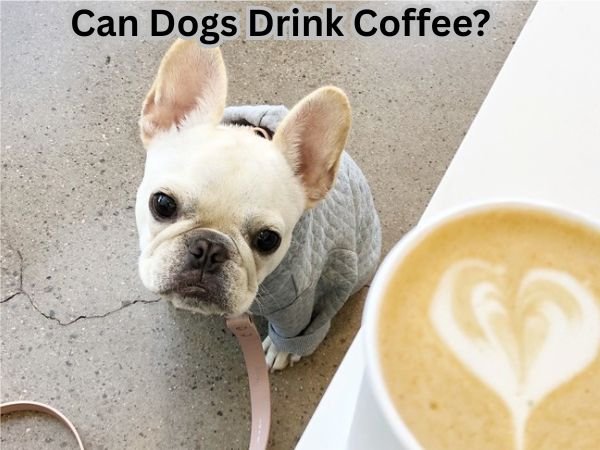
Have you ever caught your dog sniffing around your morning cup of coffee and wondered, “Can dogs drink coffee?” You’re not alone! Many pet owners are surprised to learn just how dangerous a simple sip of coffee can be for their furry friends. While sharing a treat with your dog might seem harmless, coffee contains ingredients that can seriously harm your pet—even in small amounts. From rapid heartbeats to dangerous seizures, the risks are real and often overlooked.
In this article, we’ll break down the six most serious health risks that coffee poses to dogs, so you can keep your best friend safe and healthy. Whether you’re a new dog owner or a lifelong pet lover, understanding these dangers is essential. Let’s uncover the truth behind dogs and coffee together!
Can Dogs Drink Coffee?
If you’re a dog lover who enjoys a morning cup of coffee, you might wonder: Can dogs drink coffee? The clear and direct answer is no, dogs should never drink coffee.
Why Is Coffee Dangerous for Dogs?
The main reason is caffeine toxicity. Coffee contains caffeine, which is a stimulant. While humans can handle a certain amount of caffeine, dogs are much more sensitive to it. Even a small amount can be harmful to your furry friend.
What Happens if a Dog Drinks Coffee?
If a dog drinks coffee, it can cause serious health problems. Some common signs of caffeine poisoning in dogs include:
- Restlessness or hyperactivity
- Rapid breathing or heart rate
- Vomiting
- Tremors or seizures
Even a few sips or licking up spilled coffee can be dangerous, especially for small dogs.
Why Are Dogs More Sensitive to Caffeine?
Dogs’ bodies process caffeine much more slowly than humans. What seems like a harmless amount to us can quickly become toxic to them. That’s why it’s important to keep all coffee, tea, and energy drinks out of your dog’s reach.
What Should You Do If Your Dog Drinks Coffee?
If you think your dog has had coffee, call your veterinarian right away. Quick action can make a big difference.
Keep Your Pup Safe
It’s natural to want to share everything with your dog, but coffee is one treat that should always stay off limits. Instead, offer your pup fresh water or dog-safe snacks. Your dog’s health and happiness are worth it!
Remember: When it comes to coffee, just say “no” for your dog. Keep your cup to yourself, and give your furry friend a belly rub instead!
Can Dogs Drink Coffee?
If you’re a coffee lover, you might wonder if it’s safe to share a sip with your furry friend. The short answer is no—dogs should never drink coffee. While a morning cup of coffee may be your daily pick-me-up, even small amounts can be dangerous for your dog. Here’s why coffee is bad for dogs and what you need to know about coffee toxicity in dogs.
Why Is Coffee Bad for Dogs?
Coffee contains caffeine, a powerful stimulant that affects the nervous system. While humans can handle moderate amounts of caffeine, dogs are much more sensitive to its effects. Even a small amount of coffee can lead to caffeine poisoning in dogs, which can be life-threatening, especially for smaller breeds.
Caffeine is found in all forms of coffee, including:
- Brewed coffee
- Instant coffee
- Decaf coffee (which still contains some caffeine)
- Coffee grounds
- Coffee beans
No matter the type, all these forms are unsafe for dogs.
The Science Behind Caffeine Toxicity in Dogs
Caffeine works by stimulating the central nervous system and the heart. In dogs, this can quickly spiral out of control. After ingesting caffeine, dogs may show symptoms such as:
- Restlessness and hyperactivity
- Rapid breathing and elevated heart rate
- Vomiting and diarrhea
- Tremors or seizures
- High blood pressure
- Collapse, and in severe cases, death
Symptoms can appear within 30 minutes to two hours after ingestion and may last for 12 hours or more.
How Dogs and Humans Metabolize Caffeine Differently
Humans and dogs process caffeine very differently. Our bodies break down caffeine relatively quickly, thanks to specific liver enzymes. Dogs, however, metabolize caffeine much more slowly. This means caffeine stays in their system longer, intensifying its effects and increasing the risk of toxicity.
For example:
- In humans, caffeine’s half-life (the time it takes for half the caffeine to leave the body) is about 3–6 hours.
- In adult dogs, it can be up to 47.5 hours—and even longer in puppies.
Dogs also lack certain enzymes that help break down caffeine, so even a small dose can build up to dangerous levels.
All Forms of Coffee Are Unsafe
It’s not just your morning brew that’s risky. All forms of coffee and caffeine-containing products are dangerous for dogs:
- Brewed coffee and espresso
- Instant coffee
- Decaf coffee (still contains some caffeine)
- Coffee grounds and used filters
- Coffee beans (especially chocolate-covered beans)
- Tea, energy drinks, sodas, and certain medications
Coffee grounds and beans are especially hazardous because they contain higher concentrations of caffeine. Even a few teaspoons of grounds can cause moderate to severe symptoms in a medium-sized dog.
What Should You Do If Your Dog Drinks Coffee?
If your dog accidentally drinks coffee or eats coffee grounds or beans, act fast:
- Call your veterinarian or the Pet Poison Helpline immediately.
- Note how much and what type of coffee your dog consumed.
- Watch for symptoms like restlessness, vomiting, rapid heartbeat, or tremors.
- Do not try to treat caffeine poisoning at home unless instructed by a vet.
Most dogs recover if they get prompt veterinary care, but severe cases can be fatal.
Keep Coffee Out of Paw’s Reach
Dogs are curious and may be tempted by the smell of coffee or the taste of sweetened drinks. Always keep coffee, grounds, beans, and related products out of reach. Remind family members and guests to do the same.
1. Caffeine Poisoning
Caffeine is the main reason coffee is so harmful to dogs. Dogs are much more sensitive to caffeine than people. Even a little can cause:
- Restlessness
- Rapid heartbeat
- Tremors or shaking
- Seizures
If your dog drinks coffee, symptoms can start within 30 minutes to two hours and may last up to 12 hours or longer. In severe cases, caffeine poisoning can be fatal if not treated quickly.
2. Digestive Upset
Coffee can upset your dog’s stomach and intestines. Common signs include:
- Vomiting
- Diarrhea
- Abdominal pain
Your dog’s body may try to get rid of the toxin by vomiting, but too much vomiting can lead to dehydration and weakness.
3. Heart Problems
Caffeine affects the heart and can cause:
- Elevated heart rate
- Irregular heartbeat (arrhythmia)
- Potential cardiac arrest
These heart issues are especially dangerous for small dogs or those with existing heart problems. In severe cases, dogs can collapse or even die from heart complications.
4. Nervous System Effects
Caffeine over stimulates a dog’s nervous system, leading to:
- Hyperactivity
- Muscle tremors
- Seizures
Dogs may seem anxious, unable to settle down, or may even collapse if enough caffeine is consumed.
5. Toxic Additives
Many flavored coffees or creamers contain ingredients that are toxic to dogs, such as:
- Xylitol (a common artificial sweetener)
- Chocolate
- Nutmeg
- Other artificial sweeteners
These additives can cause additional symptoms like low blood sugar, liver failure, or even death—sometimes even faster than caffeine itself.
6. Secondary Ingredient Dangers
Even if the coffee itself doesn’t have toxic additives, common extras can still harm your dog:
- Milk: Many dogs are lactose intolerant, so milk can cause gas, bloating, or diarrhea.
- Sugar: Too much sugar can lead to obesity and diabetes over time.
What Should You Do If Your Dog Drinks Coffee?
If you think your dog has had coffee—no matter how little—call your veterinarian right away. Quick action can save your dog’s life. Never try to treat caffeine poisoning at home without professional advice.
How Much Coffee Is Toxic to Dogs?
The toxic dose of caffeine for dogs is roughly 140 milligrams per kilogram (mg/kg) of body weight. This means that for every kilogram a dog weighs, ingesting about 140 mg of caffeine can be lethal. To put this in perspective, a 10 kg (22 lb) dog could be at risk after consuming around 1,400 mg of caffeine.
Caffeine affects dogs much more strongly than humans because their bodies metabolize it more slowly. Even smaller amounts can cause symptoms like restlessness, rapid heartbeat, tremors, vomiting, diarrhea, and in severe cases, seizures or death.
Caffeine Content in Different Coffee Types
Knowing the caffeine content in various coffee types can help you understand the risk if your dog accidentally consumes some:
- Brewed Coffee (8 oz / 240 ml): Typically contains between 95 to 165 mg of caffeine, with an average around 150 mg per cup.
- Espresso (1 oz / 30 ml): Contains about 63 to 75 mg of caffeine per shot. A double shot (2 oz) can have up to 126 mg or more.
- Instant Coffee (8 oz): Usually contains less caffeine than brewed coffee, ranging from 30 to 100 mg, depending on brand and quality.
- Decaf Coffee (8 oz): Despite the name, decaf still contains caffeine—typically 2 to 15 mg per cup, sometimes more depending on the brand and preparation.
Why Even Decaf Coffee Is Not Safe for Dogs
Decaffeinated coffee is not caffeine-free. It contains small amounts of caffeine that can still be harmful to dogs, especially smaller breeds or those with health issues. Additionally, flavored or sweetened coffees may contain other ingredients toxic to dogs, such as xylitol or chocolate.
Therefore, no form of coffee—regular, decaf, espresso, or flavored—is safe for dogs.
What to Do If Your Dog Drinks Coffee
If your dog accidentally consumes coffee, monitor them closely for symptoms like vomiting, diarrhea, restlessness, increased heart rate, or tremors. Symptoms usually appear within 30 minutes to 2 hours after ingestion.
If your dog shows any signs of caffeine poisoning or has consumed a large amount, contact your veterinarian immediately. Treatment may involve inducing vomiting, administering activated charcoal, controlling seizures, and supportive care.
Summary for Pet Owners
- The toxic dose of caffeine for dogs is about 140 mg per kg of body weight.
- A single 8 oz cup of brewed coffee can contain around 150 mg of caffeine, enough to be dangerous for many dogs.
- Espresso shots are highly concentrated and can be even more hazardous.
- Decaf coffee still contains caffeine and is not safe for dogs.
- Keep all coffee and coffee products out of your dog’s reach.
- If your dog consumes coffee, seek veterinary help immediately.
Sharing your coffee with your furry friend might seem tempting, but it’s best to keep their health and safety first. Instead, offer safe treats and plenty of fresh water to keep your dog happy and healthy.
This information is based on veterinary toxicology research and caffeine content data from reputable sources
Can Dogs Drink Coffee?
Dogs should never drink coffee. While it might be tempting to share your morning cup with your furry friend, coffee contains caffeine, which is toxic to dogs—even in small amounts. Dogs are much more sensitive to caffeine than humans, and what seems harmless to us can make them very sick or even be life-threatening.
What Happens If Your Dog Drinks Coffee?
If your dog sneaks a sip or, worse, gets into coffee grounds or beans, you need to act quickly. Even a small amount can cause symptoms, especially in small breeds. Coffee grounds and beans are even more dangerous due to their higher caffeine concentration.
Common Symptoms of Coffee Poisoning in Dogs
Watch for these signs within 30 to 60 minutes of ingestion (symptoms can last 12–36 hours):
- Restlessness or hyperactivity
- Vomiting or diarrhea
- Panting or rapid breathing
- Elevated heart rate or abnormal rhythms
- Tremors or seizures
- High blood pressure
- Agitation
- Collapse in severe cases
Dog Drank Coffee—What to Do: Step-by-Step Emergency Advice
If you discover your dog has consumed coffee, follow these steps right away:
- Remove Access to Coffee
- Take away any remaining coffee, grounds, beans, or other caffeinated products so your dog can’t ingest more.
- Monitor for Symptoms
- Keep a close eye on your dog for the symptoms listed above. Even if your dog seems fine at first, symptoms can develop quickly.
- Call Your Veterinarian or Pet Poison Helpline Immediately
- Don’t wait for symptoms to appear. Call your vet or the Pet Poison Helpline (855-764-7661) for guidance, especially if your dog is small or consumed a large amount.
- Provide Key Details
- Be ready to tell the vet:
- Your dog’s weight and breed
- What type of coffee (liquid, grounds, beans)
- How much was consumed (estimate if unsure)
- When it happened
- Be ready to tell the vet:
- Follow Your Vet’s Instructions
- Never try to induce vomiting at home unless your vet instructs you to do so. Some home remedies can cause more harm than good.
- Your vet may ask you to bring your dog in for treatment, which could include inducing vomiting, giving activated charcoal to absorb caffeine, IV fluids to flush the system, and medications to control symptoms like seizures or a fast heart rate.
- Act Fast for Better Outcomes
- The sooner your dog gets help, the better the chances for a full recovery. Waiting can lead to more severe symptoms and complications6.
Relatable Example
Imagine you set your coffee on the table and step away for a minute. You come back to find your dog licking the mug. It’s easy to panic, but staying calm and following the steps above can make all the difference.
How to Prevent Coffee Poisoning in Dogs
- Keep all coffee products—including grounds, beans, and used filters—out of reach.
- Remind family and guests not to give your dog sips of coffee or let them near unattended cups.
- Dispose of coffee grounds in a secure trash can3.
Emotional Connection
We all want to keep our pets safe and happy. Accidents can happen in any busy household, but knowing what to do if your dog drinks coffee can help you act quickly and protect your best friend. When in doubt, always call your vet—they’re there to help you and your pup through any emergency.
Remember: Coffee’s for humans only. Keep it away from curious noses and paws, and your dog will thank you with many more happy, healthy mornings together
Why Is Coffee Bad for Dogs?
Coffee contains caffeine, which is very dangerous for dogs. Even a small amount can cause serious health problems, like restlessness, rapid breathing, heart palpitations, muscle tremors, or even seizures. In some cases, caffeine can be life-threatening for pets.
Imagine your dog bouncing around the house after sneaking a sip. It might sound funny, but the reality is far from cute. Their bodies just can’t handle caffeine like ours can.
Safe Alternatives to Coffee for Dogs
You don’t have to leave your pup out of your coffee break! Here are some safe and fun alternatives:
- Fresh Water: The best drink for dogs is always clean, fresh water. It keeps them hydrated and healthy.
- Dog-Safe Herbal Teas: Some herbal teas, like chamomile or ginger (unsweetened and caffeine-free), can be safe in small amounts. Always check with your vet first.
- Pet-Safe “Puppuccinos”: Many pet cafés offer “puppuccinos”—a small cup of whipped cream made just for dogs. You can even make your own at home with plain, unsweetened whipped cream (in moderation).
Treats to Share Instead
If you want to spoil your dog during your coffee time, try these:
- Small pieces of apple or carrot (no seeds)
- Dog biscuits or treats
- Frozen dog-safe yogurt
It’s tempting to share everything with our pets, but coffee isn’t safe for dogs—ever. Stick to dog-friendly treats and drinks so your pup can enjoy snack time right by your side, safely and happily.
Remember: When it comes to coffee, keep the mug to yourself and give your dog a treat made just for them!
Stay safe and enjoy your coffee—with your best friend by your side!
Conclusion
To recap: coffee is unsafe for dogs in any form. Even a little bit can be harmful. The best way to protect your furry friend is to keep all coffee and related products well out of reach. If you love your dog (and we know you do!), give them fresh water instead. Let’s keep our pets safe and happy—coffee is just for humans!
FAQ
Can dogs drink decaf coffee?
No, dogs should not drink decaf coffee. Even without caffeine, decaf coffee has compounds that can upset your dog’s stomach. It’s still unsafe and not made for pets.
Can dogs eat coffee grounds or beans?
No, dogs should never eat coffee grounds or beans. They contain high levels of caffeine, which can be toxic to dogs. Even small amounts can cause vomiting, restlessness, or seizures.
Are any coffee drinks safe for dogs?
No coffee drinks are safe for dogs. Whether hot or iced, with cream or sugar, all coffee drinks can harm your dog. Stick to water for hydration.
What about tea, soda, or energy drinks?
No, dogs should not drink tea, soda, or energy drinks. These often contain caffeine and sugar, which are dangerous for dogs and can lead to serious health issues.
Why do dogs try to drink coffee?
Dogs may try to drink coffee because they like the smell or taste of milk and sugar in it. But coffee is not safe, so always keep it out of reach.



